Out today, Controligarchs: Exposing the Billionaire Class, Their Secret Deals, and the Globalist Plot to Dominate Your Life, blows the lid off of Meta’s pattern of intentionally using harmful and aggressive tactics to get users addicted to social media apps like Facebook and Instagram and documents a shocking rise in depression and suicide that some scientists have linked to social media use.

This comes just weeks after dozens of state attorneys general (AGs) filed suit against Facebook’s and Instagram’s parent company, Meta Platforms Inc. (Meta), and three of its subsidiaries, for harming children by addicting them to the social media platforms. Forty-two states, including California and New York, allege that billionaire creator Mark Zuckerberg’s company “knowingly designed and deployed harmful features on Instagram and Facebook to purposefully addict children and teens.”
Previously, Facebook whistleblower Frances Haugen claimed that Meta targeted children and teens for monetary reasons and a leaked document showed that the youth demographic was “a valuable but untapped audience.”
Just weeks after Haugen blew the whistle on Facebook’s tactics, Zuckerberg unveiled his plan to release what may prove to be Meta’s most addictive product yet: Facebook Horizon. Zuckerberg’s October 2021 virtual tour of the new product, which was panned as “super weird,” was his coming-out party for what has become known as “the metaverse”—a digital world that users can essentially live in and access via a virtual reality (VR) headset such as Facebook’s Oculus Quest.
Zuckerberg’s metaverse launch was a conveniently timed and thinly veiled rebranding effort to distract from whistleblower documents and allegations that, according to the Associated Press, show that “Facebook ignored or downplayed internal warnings of the negative and often harmful consequences its algorithms wreaked across the world.”
In October 2021, Zuckerberg changed the name of the Facebook Inc. family of companies to Meta Platforms Inc. to signal the direction his social media empire would be heading. And Zuckerberg has pumped more than $36 billion into making his metaverse ambitions a reality.
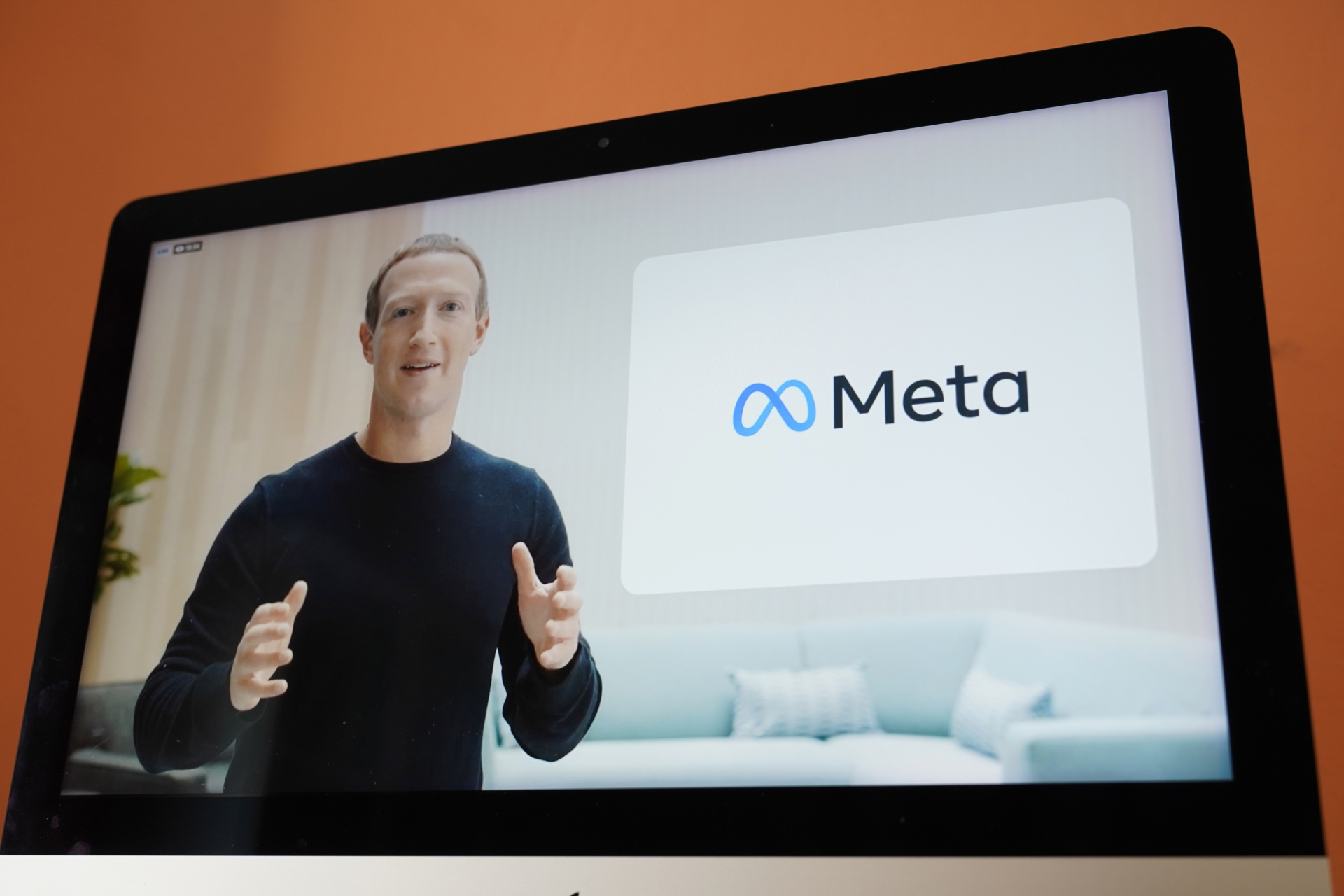
Facebook CEO Mark Zuckerberg announces their new name, Meta, during a virtual event on Oct. 28, 2021. (AP Photo/Eric Risberg)
Controligarchs reveals that Zuckerberg’s $36 billion (and growing) metaverse efforts are only just the beginning. The book documents Zuckerberg’s ongoing efforts to make the most addictive product in history: the metaverse.
One of the first virtual shops in the metaverse was a cannabis store. But it is not the tangible drugs that are the most dangerous of Meta’s offerings. The metaverse brings new consumer product offerings—including physical and biotechnological upgrades for the human body.
Meta has already filed a patent for bionic eyeballs so that users can bring their virtual reality with them everywhere and never have to leave. Zuckerberg is tinkering with other brand-new technologies, including a synthetic skin prototype called ReSkin and pneumatic “haptic gloves,” so that users could literally feel and grasp the metaverse.
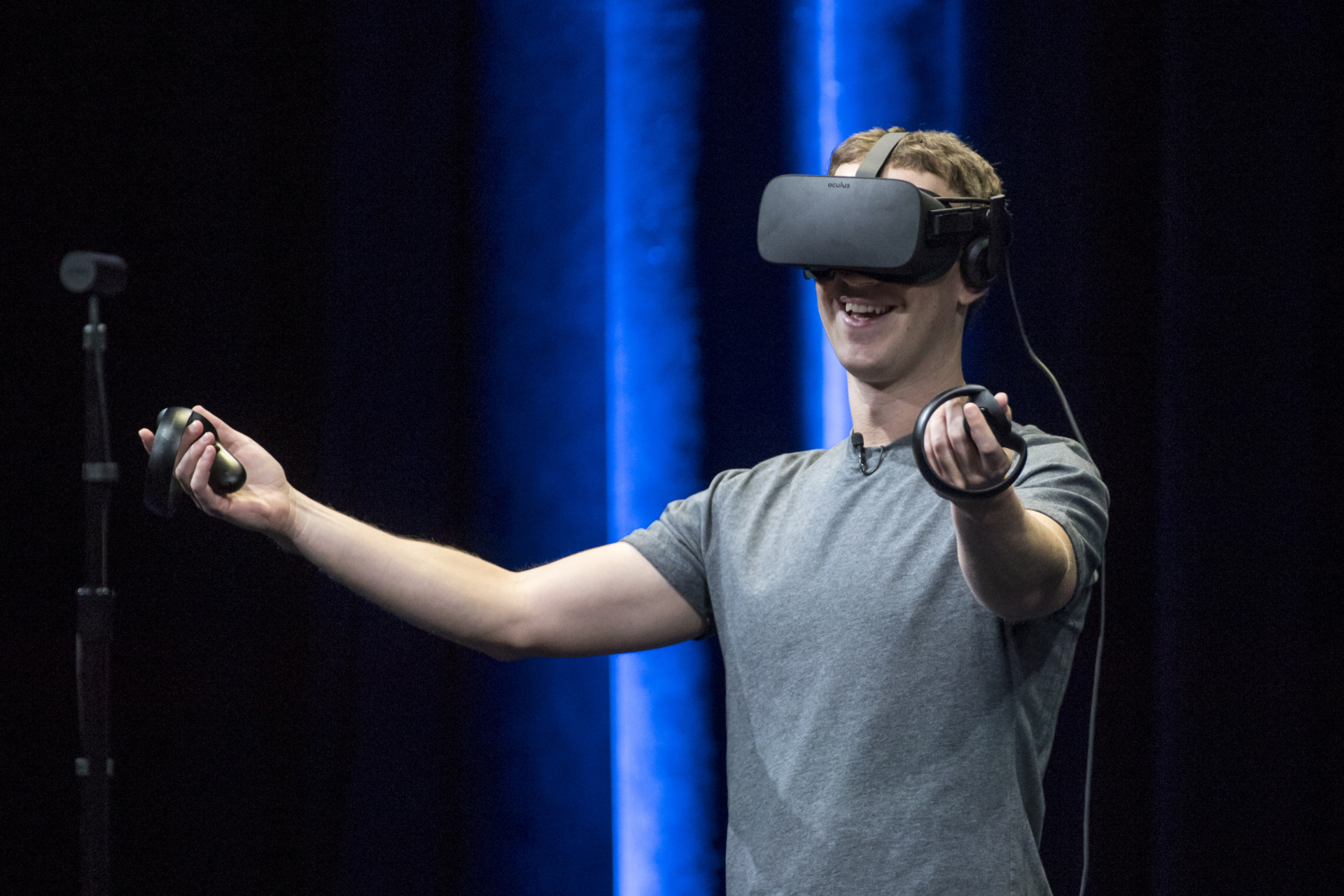
Mark Zuckerberg demonstrates an Oculus Rift virtual reality (VR) headset and Oculus Touch controllers as the gives a demonstration in San Jose, California, on Oct. 6, 2016. (David Paul Morris/Bloomberg via Getty Images)
Innovators are even developing scent blasters that shoot chemical mist at a user’s nose to allow them to “smell” the metaverse. In addition to basic scents like chocolate and strawberry (and even “beach”), there are more nuanced fragrances such as “fascinate,” “annihilate,” and “carouse.”
And while Meta’s VR aspirations appear to be failing with consumers, Zuckerberg’s obsession with the metaverse shows no signs of ceasing, as evidenced by its ongoing partnership with the popular Ray-Ban sunglasses franchise. Last Thursday, Meta announced a new strategic partnership China’s Tencent to make headsets cheaper and more accessible.
As Controligarchs documents, Meta’s losses are short term while its metaverse determinations are here to stay. More than five hundred major corporations are also helping to build the metaverse. Coca-Cola has released a new “pixel-flavored soda” that was “born in the metaverse.” Another company called Taste the TV has devised a method for users to literally lick their screens to “taste” the metaverse.
Critics believe that Meta’s losses mean that the metaverse is doomed to fail, but not so fast. iPhone’s manufacturer is set to release its own set of augmented reality glasses called Apple Vision Pro and the metaverse has big support from the World Economic Forum (WEF).
The WEF website has thousands of pages about the metaverse and a new initiative titled “Defining and Building the Metaverse.” It runs positive headlines such as “71% of Executives Say the Metaverse Will Be Good for Business. Here’s Why,” “Younger Generations Expect to Spend a Lot More Time in the Metaverse,” and “Who Will Govern the Metaverse.” The WEF has positioned itself as the arbiter of “best practices” for this new digital world.
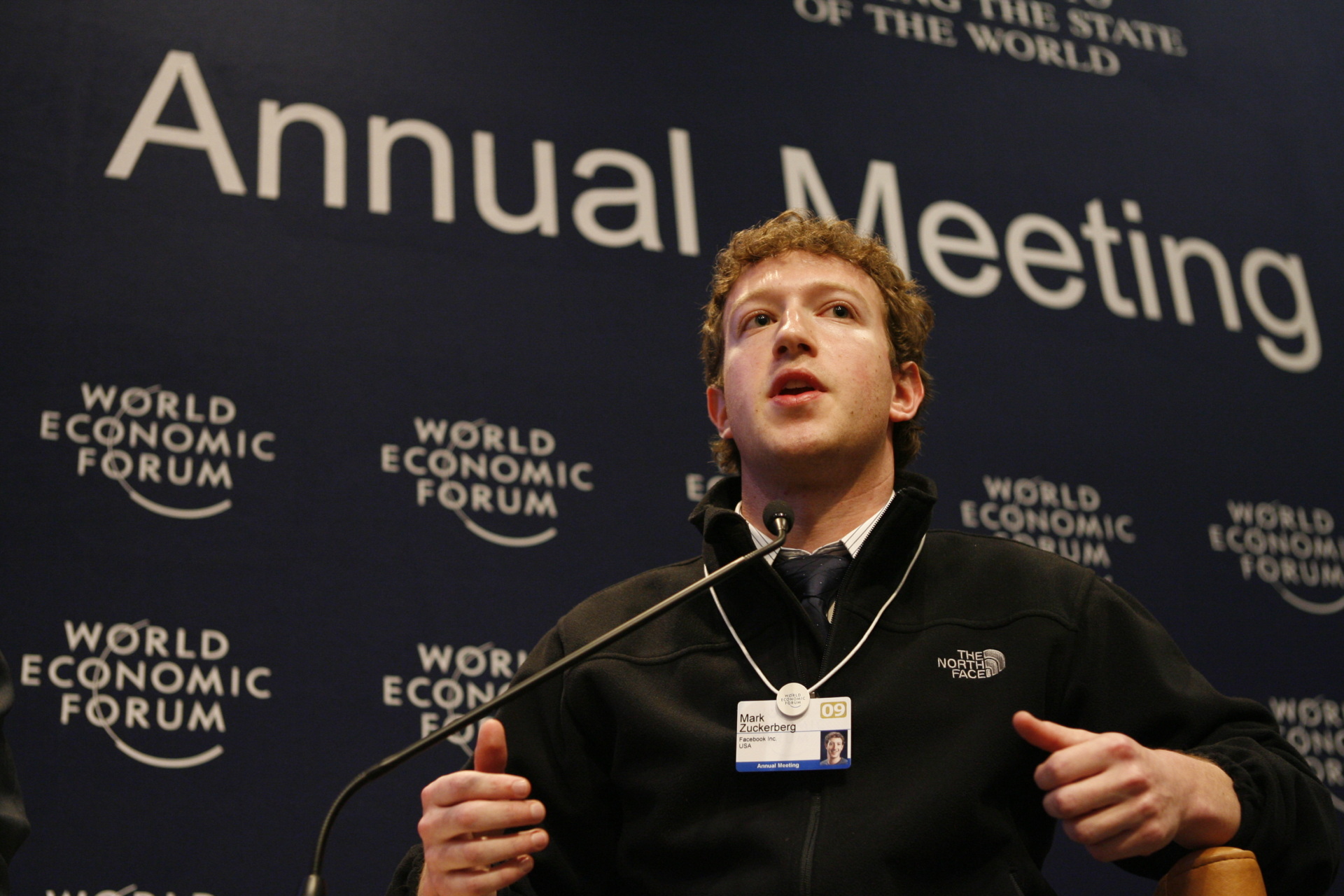
Facebook founder Mark Zuckerberg speaks at the World Economic Forum in Davos, Switzerland, on Jan. 30, 2009. (Adam Berry/Bloomberg via Getty Images)
The book shows that Zuckerberg has had a general disdain for the users of his products since before Facebook (in its current form) was even founded. When asked why people share personal data with him, the Facebook founder said: “People just submitted it. I don’t know why. They ‘trust me.’ Dumb fucks.” In fairness, Zuckerberg made the comment while in college at Harvard and has since distanced himself from it stating that he “absolutely” regretted the comment and thinks he has “grown and learned a lot.”
According to Controligarchs, Facebook has always exploited its users by making its features addictive, as admitted by Facebook’s founding president Sean Parker who called it a “social-validation feedback loop.” Every time a Facebook (or Instagram) user hears the notification chime, the brain emits “little dopamine hit,” Parker said, and the user gets a rush.
Controligarchs has also uncovered that the architect of the metaverse, Vishal Shah, previously served as an Instagram developer and was involved with the effort to launch “Instagram for kids.” A 2019 study found that depression and suicidal tendencies are rising among teens, and they pointed to social media use as a possible culprit.
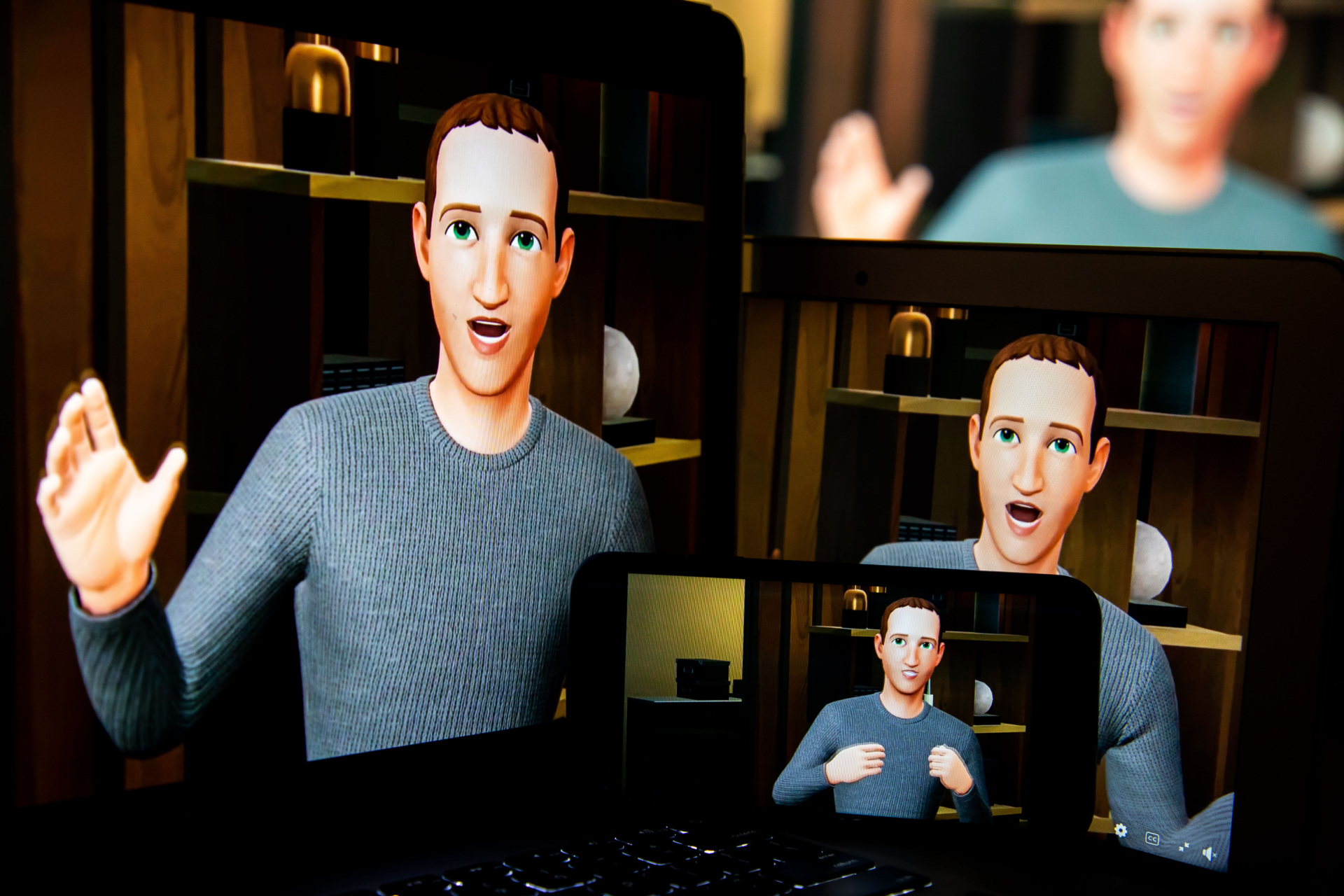
A metaverse avatar of Mark Zuckerberg speaks during the virtual Meta Connect event in New York on Oct. 11, 2022. (Michael Nagle/Bloomberg via Getty Images)
“Facebook is going back to its old tricks, offering another product designed to get kids hooked when they are the most vulnerable,” said the head of an organization called Common Sense. The Campaign for a Commercial-Free Childhood cited several studies to conclude that “excessive use of digital devices and social media is linked to a number of risks for children and adolescents, including obesity, lower psychological wellbeing, increased risk of depression, and increases in suicide-related outcomes.”
Zuckerberg’s Meta rebrand was criticized as a “tactic” or potential “distraction” from the fact that his companies rely on addiction as a business model. But the reality is that Meta’s new VR products may have even greater potential to addict users.

Mark Zuckerberg speaks during the Oculus Connect 5 product launch event in San Jose, California, on Sept. 26, 2018. (David Paul Morris/Bloomberg via Getty Images)
The recent lawsuits by state AGs across the United States must get to the bottom of the addictive efforts—tantamount to mind control—and hold Zuckerberg and his companies accountable.
Seamus Bruner is the author of the pathbreaking new book, Controligarchs: Exposing the Billionaire Class, Their Secret Deals, and the Globalist Plot to Dominate Your Life, which hits bookshelves everywhere on November 14. Bruner is Peter Schweizer’s Director of Research at the Government Accountability Institute. Schweizer says Controligarchs is “Haunting” and “MASSIVE.”
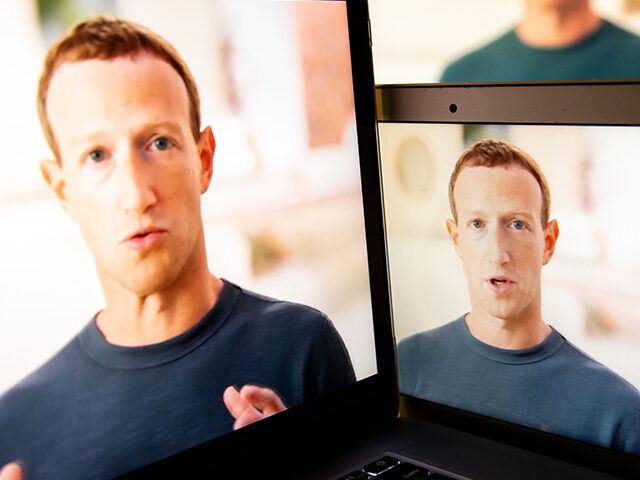
COMMENTS
Please let us know if you're having issues with commenting.